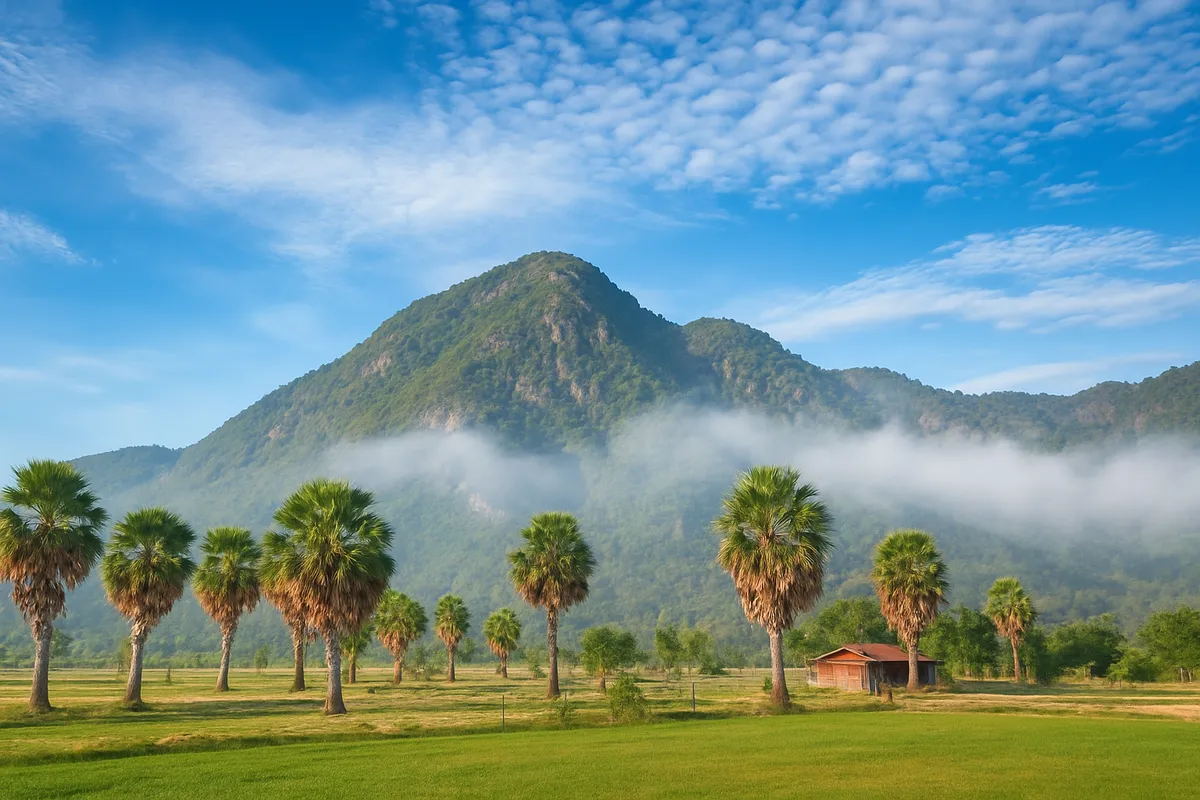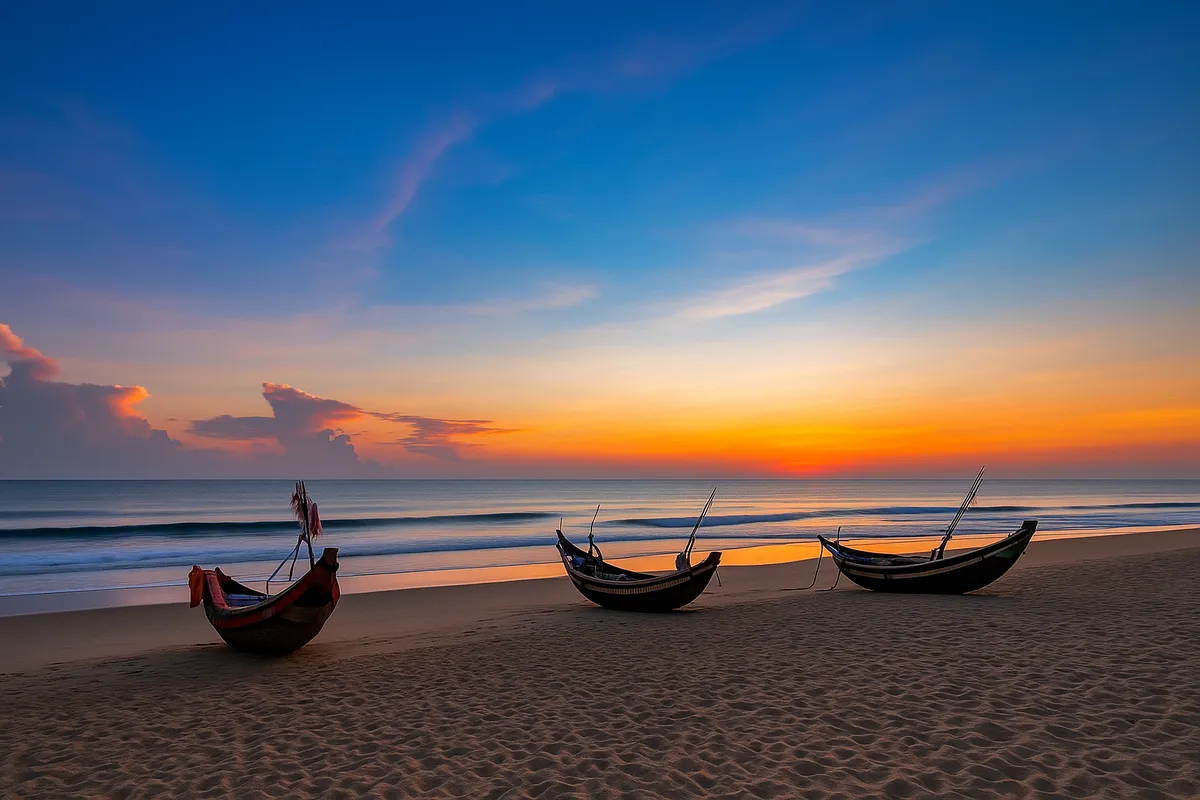Is Mui Nai Beach still a secret of Ha Tien?
- Sunday, Jun 01, 2025, 20:11 (GMT+7)
Is Mui Nai Beach still a secret of Ha Tien?
Mui Nai Beach is where the sun awakens the southern dream with golden honey hues gently spread across the sea surface, where the waves do not merely crash upon the shore but whisper something ancient and distant. Amid the sunlit town of Ha Tien and the salty scent of the sea, there lies a place where time seems to slow down, where sunlight softens, and stories are told not through words but by footprints left on the sand.
The name Mui Nai is more than just a location. It is a tender reminder of an old legend. Locals say a divine deer once wandered from the forest each evening to gaze at the sunset dipping into the sea. One day, mesmerized by the vast seascape, the deer forgot its way home and sat on a rock watching the silver waves until it turned to stone. Since then, the headland reaching out to the sea has been known as Mui Nai. Even for those who do not believe in such tales, it is hard not to feel moved by the image of a lone deer staring into the ocean, like a painting that has just stepped out of a fairytale dream.
Mui Nai does not resemble the famous beaches. Its water is not clear blue like Maldives or Phu Quoc but carries a shimmering silt tone, like golden brown silk gifted by the heavens. The sand is not white and smooth but dark and rich in minerals. Simply burying your bare feet into it, you can feel the warmth of the earth, like a natural therapy soothing every worry. As the sun slants across the sea at dusk, the grains of sand glitter as if sprinkled with sugar, reflecting light like strands of silk, making each footprint feel sacred.
Bai Bang and Bai No are two different memories of Mui Nai. Bai Bang is gentle like a lullaby of summer, with soft, shallow sands where children can play safely away from strong waves. Bai No breathes the essence of an old fishing village, where nets still dry under the morning sun, and the scent of seaweed mixes with distant calls of fishermen. Each boat holds a story, and every net is a wish cast into the endless water and sky.
But if Mui Nai were only about sea and sand, it would not be so special. Hidden on the summit of Ta Pang mountain right beside the beach, a slide track over a kilometer long offers a unique point of connection between nature and experience. Gliding down the winding rail through bushes and trees, the wind brushes your hair and the full panorama of Ha Tien’s sea unfolds before your eyes. Someone once said that only when standing atop Ta Pang to view Mui Nai, can you truly understand what it means for the soul to fall silent in a single breathtaking moment.
On breezy afternoons, flocks of sea sparrows swirl in the sky as if dancing in the golden light. From afar, Phu Quoc Island appears faintly like a shadow of the southern dream, reminding visitors that Mui Nai is not just a destination, but the beginning of many ocean-bound journeys.
There is something few notice about the brown sands of Mui Nai. They contain natural iron particles, making this one of the rare beaches in Vietnam known for its sand therapy. Locals still maintain the habit of laying towels on the sand each early morning, lying down to "listen to the healing of the sand." A treatment needing no machines or noise, just the sound of wind, the rhythm of waves, and the warmth of the earth seeping into the skin.
At Mui Nai, there is no need to chase after loud entertainment. Here, slow living is not a trend but a genuine pace of life. Under the whispering coconut palms, one may find humble food stalls selling crispy sizzling pancakes, fragrant rice noodles with shredded pork, or pandan-scented Ha Tien sticky rice. Some dishes carry the sweet flavor of palm fruit, others a gentle spice, as if reminding you of the quiet depths of this land. Fresh herring salad, handmade rice noodles, and grilled red dried fish are not just delicious but tell stories of the sea, the people, and the coastal way of life.
If there is an ideal time to visit Mui Nai, it would be from late autumn to early spring, when the rain no longer falls unexpectedly, the sea is calm like a mirror, and the wind is just enough to stir your hair. The journey often begins in Rach Gia or Can Tho by car or bus, winding along the provincial road past Ha Tien market, through slopes adorned with paper flowers, until the sea waves hello from the edge of the horizon.
But Mui Nai is not for the hurried. Those who come merely for a few photos and leave in haste may find only a moderately pretty beach. It takes time to truly feel its softness—to let your feet sink into the sand, your skin meet the breeze, and the salty mist settle in your hair. Then you begin to understand this place. There is a small stone near the beach carved with words that say, "Sometimes, all you need is a place where your soul can rest."
Few people know that Ha Tien was once the birthplace of a refined literary movement known as “Ha Tien thap vinh,” ten classical poems composed by Mac Thien Tich, a literature-loving regional governor in the eighteenth century. Those poems describe the beauty of Giang Thanh river, Da Dung mountain, and Hang pagoda, but also whisper of Mui Nai. Their verses still seem to linger in the sea breeze, reminding us that this land is not only scenic but also soulful.
Mui Nai does not promise excitement, nor does it demand enthusiasm from its visitors. It simply exists, quietly, like a pause between the overwhelming rhythms of modern life. Those in search of a place to reflect, to gaze at the sea without reason, to hear birdsong and the sound of stillness, will find themselves here. A photograph may capture the scene, but only a walk across the twilight sands of Mui Nai can preserve the feeling.
And when the sun slowly sinks beyond the horizon, casting deep violet across the sea, the waves no longer chase each other but ripple like a lullaby, one finds it hard to leave. In that moment, Mui Nai is no longer a tourist spot, but a profound silence. Like a phrase written in sunset light upon the sea’s surface, “Here, every wound of the soul is mended by the sea breeze.”

 CHECKIN.VN
CHECKIN.VN








Share on